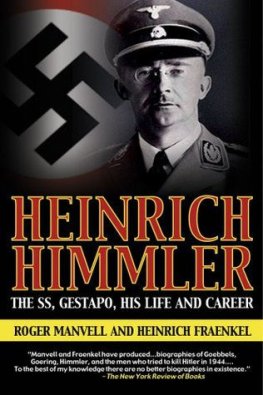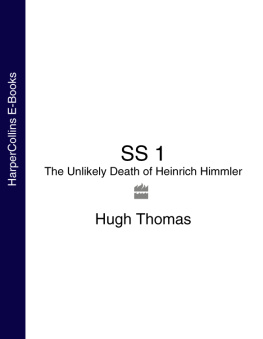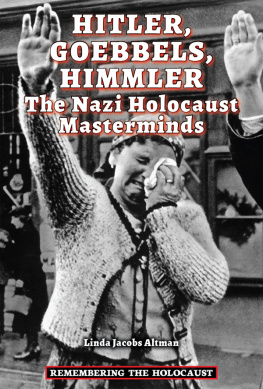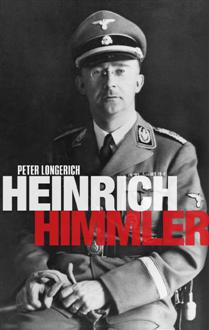This edition is published by PICKLE PARTNERS PUBLISHINGwww.pp-publishing.com
To join our mailing list for new titles or for issues with our bookspicklepublishing@gmail.com
Or on Facebook
Text originally published in 1953 under the same title.
Pickle Partners Publishing 2016, all rights reserved. No part of this publication may be reproduced, stored in a retrieval system or transmitted by any means, electrical, mechanical or otherwise without the written permission of the copyright holder.
Publishers Note
Although in most cases we have retained the Authors original spelling and grammar to authentically reproduce the work of the Author and the original intent of such material, some additional notes and clarifications have been added for the modern readers benefit.
We have also made every effort to include all maps and illustrations of the original edition the limitations of formatting do not allow of including larger maps, we will upload as many of these maps as possible.
HIMMLER,
THE EVIL GENIUS OF THE THIRD REICH
BY
WILLI FRISCHAUER
PRELUDE
IT WAS the evening of 21 May, 1945. From the screen of the little cinema in the Westphalian town of Lneburg the familiar voice of Bing Crosby came crooning: Going my way..., and the men in khaki who listened to it were thoroughly enjoying themselves. They belonged to Britains famous Second Army, and most of them were attached to Montgomerys headquarters not far from Lneburg Heath, where he had recently accepted the surrender of Nazi Germany.
Edwin Austin, a burly sergeant-major from the London suburb of Barnes, was happily humming in tune with the American film-star when the performance was interrupted and a notice flashed across the screen: Sergeant-major Austin of H.Q. Company, it said, is requested to report to headquarters at once.
I could guess what it meant, Edwin Austin told me when we discussed the events of the evening. Obviously somebody was going my way. The call which interrupted his evenings entertainment did not come entirely as a surprise to him. One of the tasks allotted to H.Q. Company and Austin was to deal with very important Nazi prisoners when they were brought to Lneburg for interrogation. I was a dustman in civilian life, he mused. Curious that it should fall to me to handle this human rubbish! The urgent summons indicated that another big fish had been caught in the allied net.
Yet Austin felt uneasy when he arrived back at No. 33 Uelzenerstrasse, the house in which headquarters had been installed. Right here a few days earlier he had guarded S.S. Obergruppenfhrer (Upper Group Leader) Prtzmann, commander of the so-called Werwolf, the Nazi resistance movement against the allied occupation forces. Following instructions, Austin had searched his prisoner and quickly discovered a capsule containing poison such as every Nazi leader was known to carry on his body. But Prtzmann had a second phial hidden in a cavity of his mouth and before Austin could stop him had crushed it with his teeth, swallowed the poison, to die a quick but painful death.
Austin was acutely conscious of his failure to preserve the life of this valuable prisoner from whom allied officers had hoped to extract much information. It must not happen again. The safest way to avoid a repetition of the Prtzmann incident, Austin thought, would be to knock out the next prisoner on arrival and to search him before he regained consciousness. He had prepared a sandbag for the purpose. But when he had mentioned his plan to Colonel Murphy, Second Army Chief of Intelligence, the colonel had refused to give his approval. Yet Austin had his hand on the sandbag as he strolled outside No. 33 to await the new arrival.
At 9.45 p.m. the car carrying the prisoner arrived at H.Q. First to emerge from it was Colonel Murphy. Austin did not know who the prisoner was. A question in his eye, he looked at Colonel Murphy, who shook his head and Austin had little time to think before he saw a quaint figure emerging from the car. Dressed in a khaki shirt and a pair of underpants, an Army blanket wrapped around him, short-sighted eyes blinking in bewilderment, the man stumbled towards the sergeant-major, who gripped his arm to lead him through the door into the house.
He had no moustache, Austin told me, but I recognized him at once. Quickly he bundled the prisoner into a prepared room. We have searched him before, said Captain C. J. L. Wells, the medical officer, who had arrived with him. But wed better examine him once more....
Pointing to an empty couch, Austin told the prisoner: Thats your bed. Ausziehen! he added in Germanget undressed! He was met by a cold stare; He does not know who I am! muttered the man from behind his blanket: Oh, yes I do! Austin replied. Youre HIMMLER. But still thats your bed. Get undressed! Slowly Heinrich Himmler started to take off his pants, then the shirt. Now wheres that poison...? Austin asked himself as the Army doctor and the colonel got down to a thorough examination. Toes, ears, hair, every inch of his naked body was inspected. Open your mouth, ordered Captain Wells. Obediently Himmler opened up. Get up and come closer to the light!
Himmler ran his tongue around his lips. Captain Wells was not satisfied, and prepared to put two fingers into his mouth, but Himmler drew his head away and, clamping down on the doctors fingers, crushed a phial of poison. He had carried it in his mouth for hours. At once Colonel Murphy and Austin jumped at him. As Himmler fell Austin grabbed him by the throat and Colonel Murphy raised his feet high in an attempt to make him disgorge the poison. We struggled hard, Austin said; we tried artificial respiration. It was all in vain...! After a quarter of an hour Heinrich Himmler was dead. Austin threw a blanket over him and left him.
Himmlers death was the subject of an exhaustive investigation, but the British War Office has never revealed the result Austin is fully aware of the rumours which surround the critical half-hour of that May evening in Lneburg. People persist in asking him whether it is not true that he had, perhaps, used his sandbag on Himmler after all, or his fists; whether he had not, perhaps, handled him a little roughly in an understandable upsurge of indignation such as any decent man might feel when coming face to face with a monster who had been responsible for the death of millions.
Austin finds himself in an invidious position when people are prepared to shake the hand of the man whom, they insist in believing, Fate had selected to avenge the lives of the countless victims of the Gestapo and the concentration camps! I should not mind if it were true! he said. But it is a fact that Himmler died by his own hand and I did nothing to hasten his decision!









